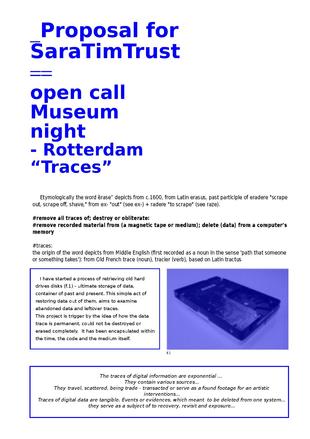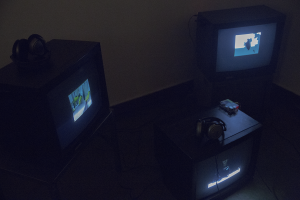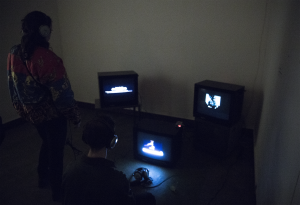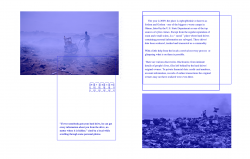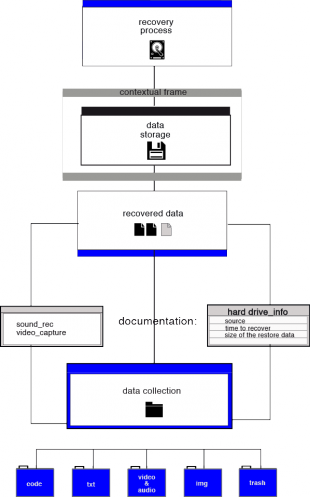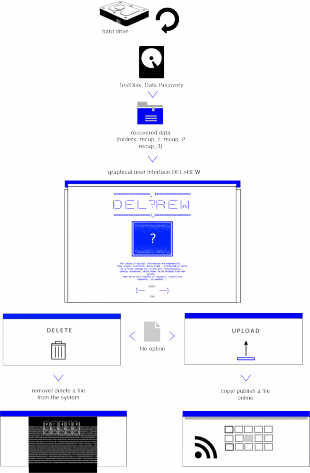DEL? No, wait! REW
| Student | Michaela Lakova |
|---|---|
| Graduation Year | |
| Featured image | File:File:TENT Unlinked 12.jpg |
| Work Description | |
| Bio | Michaela Lakova(BG) takes a lost and found approach to media. Her field of research and practice involves catchy bits and bytes of errors, systems malfunction and the inevitable generation of data traces and its problematic resistance to deletion. |
| URL | http://mlakova.org |
Generative koplets video series
In an installation piece three CRT TVs are placed next to each other, displaying the Generative koplet videos#1,#2and 3 in a loop, forming an almost sculptural piece.
Two of the video works consist of textual and pictorial fragments of retrieved data from the hard drives.
Generative_koplet#1 consists of an array of abstract visuals of various maps, cities and coordinates contrasted
by their generative black and white quality.
Generative_koplet#2 depicts a production line of workers in a factory disassembling pineapples in Ghana,
emotionless in their everyday routine and presented in a semi-documentary style.
Generative_koplet#3 serves as a behind-the-scenes view of the recovery process, where I positioned myself at the center, placing the hard drive into an ATA hard drive** case and running the recovery software documenting every step of mine. This meta-video provides an inside look into a common procedure of repetitive acts in an attempt to perform this rather trivial action.
The soundtrack of the videos is a slightly distorted sound from a powered up and spinning hard drive recorded
from the interior of the drive and drawing its presence into the physical world.
The most common question among the visitors of the exhibition space in regards to the work was whether the
actual owner was aware of my actions. To which I simply replied: 'No'.
- The Generative koplet#1, #2, #3 series took part in an installation at SaraTimTrust. It was part of a group at this
year’s MuseumNacht in Rotterdam on the topic of Traces.
- Serial ATA (SATA) is a physical device that providing a connection between a host system (a computer) and
storage device such as hard disk drives and optical drives. This communication is performed via a high-speed
serial cable.
[Err_booklet]
The [Err] Booklet is a visual assemblage of found images from the mentioned hard drives, Internet materials related to the research topic and photographs I took during the process of writing the thesis. This booklet aims to trace back the process of data recovery, display and potentially erase lost and found artifacts of data. It is also a work log of personal thoughts, observations, concerns and frustrations, which surpasses the actual process. It archives and provides a visual essay, contextualizing the field of research. While designing the book I decided to unify all the images in blue color - a common color found in the recovery process often present as a corrupted data. Interestingly blue is often associated with the notion of the “digital”. “Blue is literally the coolest color in the color spectrum (with a temperature of 15,000 to 27,000 Kelvin), with further suggestions of cultural coolness and cleanness of the digital” as cited by Florian Cramer** in a recent publication called “What is ‘Post-digital’?”. (Cramer, n.d.)
- Cramer, Florian. What is‘Post-digital’?, Transmediale, 2014. Available on: http://www.aprja.net/ ?p=1318
In this case the digital color blue could be also perceived as possible connotation for technology failure.
===============_ ?============== __ ___ __ __ ___ | \ |__ | _||__) |__ | | |__/ |___ |___ . | \ |___ |/\| ===============!_===============
DEL?No, wait!REW installation
DEL?No, wait!REW asks is it possible to delete information in the digital age? Whether our storage devices are locally present (hard drives) or dislocated (the cloud), can we ever be certain our data has been permanently deleted? In the ongoing conversation around the impossibility of erasing digital traces, what role do we take? Are we plunderers, interpreters or mediators?
The automatized system you are witnessing recovers files from retrieved hard drives without the consent or the knowledge of the previous owners, who presume their content has been deleted. You can now choose whether to delete them forever or save them by publishing them online.

